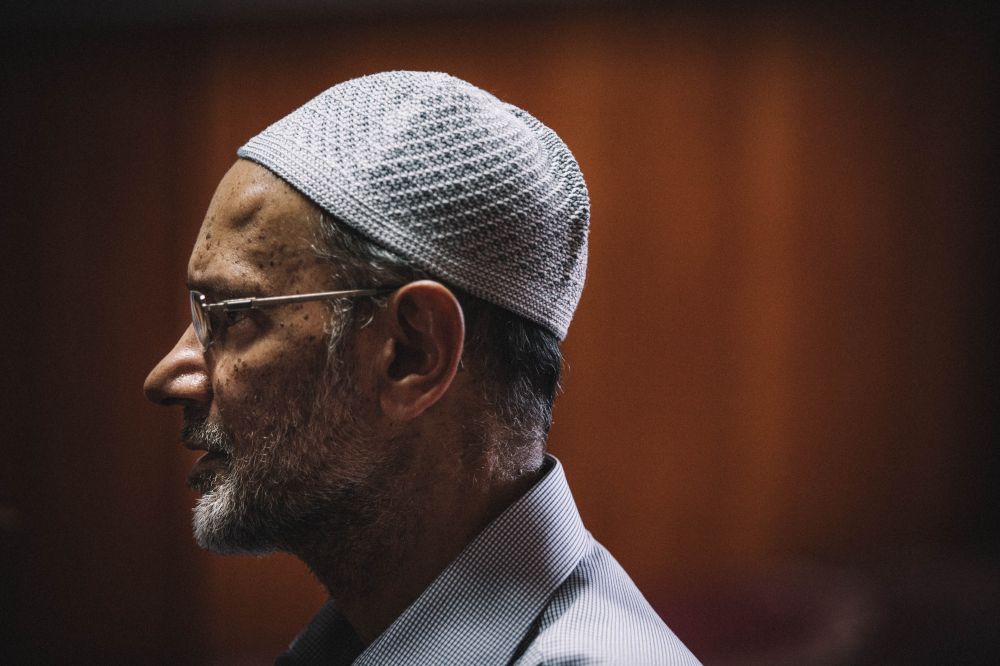Knowledge. It seems to be the key word of the speech of Abdul Rehman Mangá, Portuguese born in Mozambique who still had as capital Lourenço Marques. His half hour, in Portuguese. Abdul Kadir, the young imam from Morocco, would later say it in Arabic. Before Friday's main prayer. Knowledge. And to make known, to understand Islam, would be much easier if the Muslim community in Porto, five thousand people, round numbers, could be visible. And it just can't, yet, because it lacks a mosque built from scratch. A mosque like the one in Lisbon that invited the world to come in and understand. "We are working with the Porto's City Hall to find suitable land and then get funding."
You can't even talk about a minority now. "When I arrived in Porto in 1984, we would be ten or 15 families." Most families stay at Lisbon, where the planes from the old colonies landed. Because that is where there is the largest mass of Muslims. Mozambique and Guinea. Only later did they arrive from Senegal and the Maghreb. Abdellah Mouazza moved from Morocco with the Portuguese wife. In 1985. "There were only two (Arab) lords, one from Jordan and one from Egypt." Physical education teacher, opened a gym in Rua do Heroísmo. Yes, where is the mosque today. Sitting on the immaculate red carpet of the mosque, he tells us that only the opening of immigrant legalization processes in the early 2000s brought an Asian contingent that, by the difference, turns out to be the most visible in Porto. These will be among the most difficult to find in integration. And the barrier, says Abdul Rehman, is just one: the language. The Cultural Center is there to help them. And to teach them also the word of the Quran. The patience.
Quietly, still damp feet from the ablutions, they enter and settle down the carpet lines. Some put on the clean socks they bring in their pockets. "This is where we will bow down." Simple. The shoe that came from the street cannot enter. To be sacred ground, as is the valley of Tuwa, is the religious version. One serves the other, so it is with many of the teachings, the ablutions, the banned pork. Others stop at the entrance to grab one of the community skullcapes, three or four women sneaking behind the curtain behind them, to the sound of Abdul Rehman's sermon, managing director of the Amorim Group, before the recited adzan by the powerful voice of Adbul Kadir.
“It is important to know each other. If I go to Rome, I try to know that cult better. ” Knowledge improves the relationship between cultures, religions. This is why having a root mosque is important. In order to be visited. To be able to say, "Please do not be afraid of Islam."
Mahmut, by the way Jaime Soares, son of Portuguese Catholics, recited the "shahadah" going for two years. And reach out where it can serve. Pedagogical director of a college in Gondomar and professor of philosophy (it was in the chair of medieval philosophy in college that Allah appeared to him on the way) speaks with the simplicity that he says he found in the Quran, “the most complete book”, of patience with trying to teach the missing Portuguese to these Muslims. Or the Arabic and Quran to the little ones. "Read, in the name of God," said the prophet Muhammad (said Muhammad, always) to the angel Gabriel. Know, learn.
"The more knowledgeable of religion we are, the less likely we will be to engage in acts like these, because these acts have to do with the other side of Islam, that of ignorance about religion." For example, James describes to us the simplicity of charity through zakhat, which is the obligatory alms but does not have to be done in front of witnesses. "Allah is the one who sees." The simplicity of that ethereal alms embodied, for example, in visiting sick brothers. Or arrested.
Text by Ivete Carneiro (Jornal de Notícias newspaper)
Improvised Mosque of Porto
Porto, Portugal
© 2015 Igor Martins (Global Imagens Agency)

















